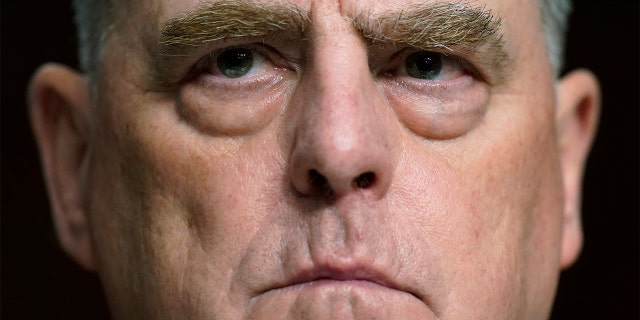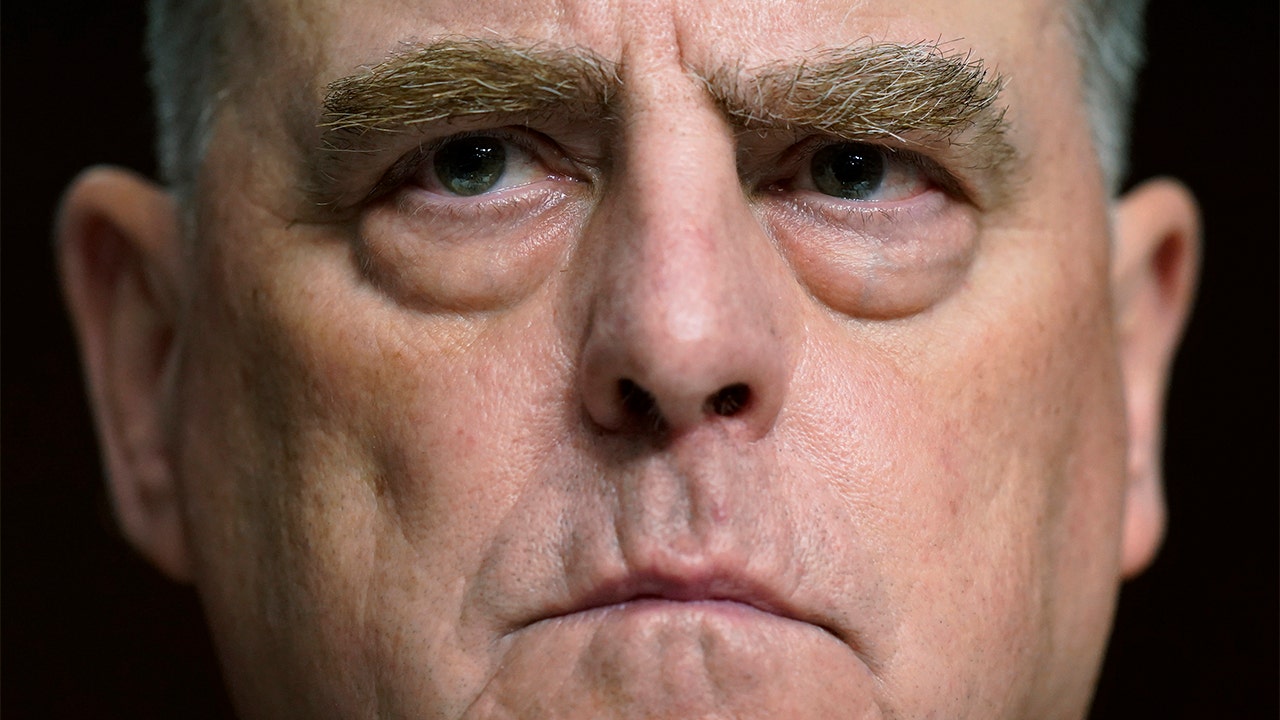Milley, Austin to face new round of Afghanistan questions in House hearing after contradicting Biden
Defense Secretary Lloyd Austin, Chairman of the Joint Chiefs of Staff Gen. Mark Milley and head of U.S. Central Command Gen. Kenneth F. McKenzie are heading to the other side of Capitol Hill Wednesday for their second day of testimony on the Biden administration’s withdrawal from Afghanistan – this time, before the House Armed Services Committee.
Austin, Milley and McKenzie are set to testify Wednesday at 9:30 a.m. ET. The trio faced a full day of questioning from lawmakers on the Senate Armed Services Committee Tuesday in open and closed sessions.
There are 59 members on the House Armed Services Committee. Each member will be given five minutes to ask questions. Austin, Milley and McKenzie each have an allotted five minutes to deliver opening statements at the beginning of the hearing.
PSAKI CLAIMS MILITARY ADVISERS WERE ‘SPLIT’ ON TROOPS IN AFGHANISTAN, DESPITE MILLEY TESTIMONY
Milley’s and McKenzie’s testimony put the White House on defense Tuesday after they testified that they assessed that the U.S. should maintain a presence of at least 2,500 troops in Afghanistan despite President Biden’s claims to the contrary.
“I won’t share my personal recommendation to the president, but I will give you my honest opinion and my honest opinion and view shaped my recommendation,” McKenzie testified. “And I recommended that we maintain 2,500 troops in Afghanistan.”
McKenzie said he made a similar recommendation in the fall of 2020 under the Trump administration, which also had intentions to withdraw all U.S. troops from Afghanistan, saying, at the time, he recommended the U.S. maintain at least 4,000 troops.
“I also have a view that the withdrawal of those forces would lead inevitably to the collapse of the Afghan military forces and eventually the Afghan government,” McKenzie testified.
Milley was also pressed on the matter, saying that while he would not share his “personal” recommendations made to the president, his assessment was, “back in the fall of 2020, and remained consistent throughout, that we should keep a steady state of 2,500 and it could bounce up to 3,500, maybe, something like that, in order to move toward a negotiated solution.”

Chairman of the Joint Chiefs of Staff Gen. Mark Milley listens to a senator’s question during a Senate Armed Services Committee hearing on the conclusion of military operations in Afghanistan and plans for future counterterrorism operations, Tuesday, Sept. 28, 2021, on Capitol Hill in Washington. (AP Photo/Patrick Semansky, Pool)
(AP Photo/Patrick Semansky, Pool)
Biden and White House officials have said repeatedly that no military leaders advised him to leave a small military presence behind, with the president telling ABC News in August that “no one” recommended a 2,500-troop presence that he could “recall.”
Austin was asked whether the president received the personal recommendations from his top military advisers, like Milley and McKenzie.
“Their input was received by the president and considered by the president for sure,” Austin testified.
Despite their testimony, White House press secretary Jen Psaki said military advisers were “split” on whether to maintain a presence of U.S. troops in Afghanistan.
“There was a range of viewpoints, as was evidenced by their testimony, presented to the president and presented to his national security team, as would be expected, as he asked for – he asked for a clear-eyed – he asked them not to sugarcoat it – what their recommendations were,” Psaki said.
Psaki maintained that had the president decided to listen to advisers’ recommendations, the U.S. later “would have had to increase the number of troops, would have been at war with the Taliban, we would have more U.S. casualties.”
MILLEY SAYS RESIGNING WOULD BE ‘INCREDIBLE ACT OF POLITICAL DEFIANCE,’ UNDER COTTON PRESSURE
“There are some who felt we should have still done that,” she said. “That is not the decision the president made. It is up to the commander in chief who makes those decisions.”
“Ultimately, regardless of the advice, it is his decision,” Psaki said. “He is the commander in chief. He is the president. He makes the decisions about what is in the national interest, and he believed we should end the war.”
Psaki again stressed that the president “made clear the advice was split.”
“I think the American people should know the president is always going to welcome a range of advice, he asked for candor and directness… he is not looking for a bunch of yes men and women,” Psaki said. “Ultimately, he is going to have to make the decision about what is in best interest of the United States.”
She added: “If there is conflicting advice given, by necessity, some people’s advice will not be taken.”
Milley was also pressed on why he has not resigned after Biden ignored his recommendations.
“Senator, as a senior military officer, resigning is a really serious thing – it’s a political act – if I’m resigning in protest,” Milley said. “My job is to provide advice – my statutory responsibility is to provide legal advice or best military advice to the president, and that’s my legal requirement. That’s what the law is.”
CLICK HERE TO GET THE FOX NEWS APP
Milley added that the president “doesn’t have to agree with the advice,” and said he “doesn’t have to make those decisions just because we’re generals.”
“It would be an incredible act of political defiance for a commissioned officer to just resign because my advice is not taken,” Milley said. “This country doesn’t want generals figuring out what orders we are going to accept and do or not. That’s not our job.”
He added, on a personal note, that “my dad didn’t get a choice to resign at Iwo Jima, and those kids at Abbey Gate don’t get a choice to resign.”
“I’m not going to turn my back – they can’t resign,” Milley said. “So I’m not going to resign. There’s no way.”
“If the orders are illegal, we’re in a different place,” Milley said. “But if the orders are legal from civilian authority, I intend to carry them out.”
MILLEY SAYS RESIGNING WOULD BE ‘INCREDIBLE ACT OF POLITICAL DEFIANCE,’ UNDER COTTON PRESSURE
Austin’s, Milley’s and McKenzie’s testimony comes nearly a month after the Biden administration on Aug. 31 withdrew all U.S. military assets from the region after having a presence there for 20 years following the attacks on Sept. 11, 2001. An Aug. 26 suicide bombing took the lives of 13 U.S. service members – including 11 Marines, one Navy sailor and one Army soldier. Eighteen other U.S. service members were wounded. The bombing also left more than 150 civilians dead.
As the Biden administration began the withdrawal of military assets, provincial capitals across Afghanistan began to fall to the Taliban. By mid-August, the Taliban attained control of two-thirds of Afghanistan. And by the time the U.S. withdrew all U.S. troops from the country on Aug. 31, Kabul had also fallen to the Taliban. In mid-August, U.S. intelligence assessments projected the capital city could fall to the Taliban within 90 days.
The withdrawal concluded on Aug. 31, with the U.S. evacuating more than 124,000 individuals – including 6,000 Americans.
But administration officials admitted to leaving more than 100 American citizens behind. Administration officials, though, said their mission in Afghanistan had shifted from a military mission to a diplomatic one, with some saying they were working with the Taliban to ensure safe passage for those Americans and U.S. visa holders, as well as some Afghan allies, to evacuate the country.




